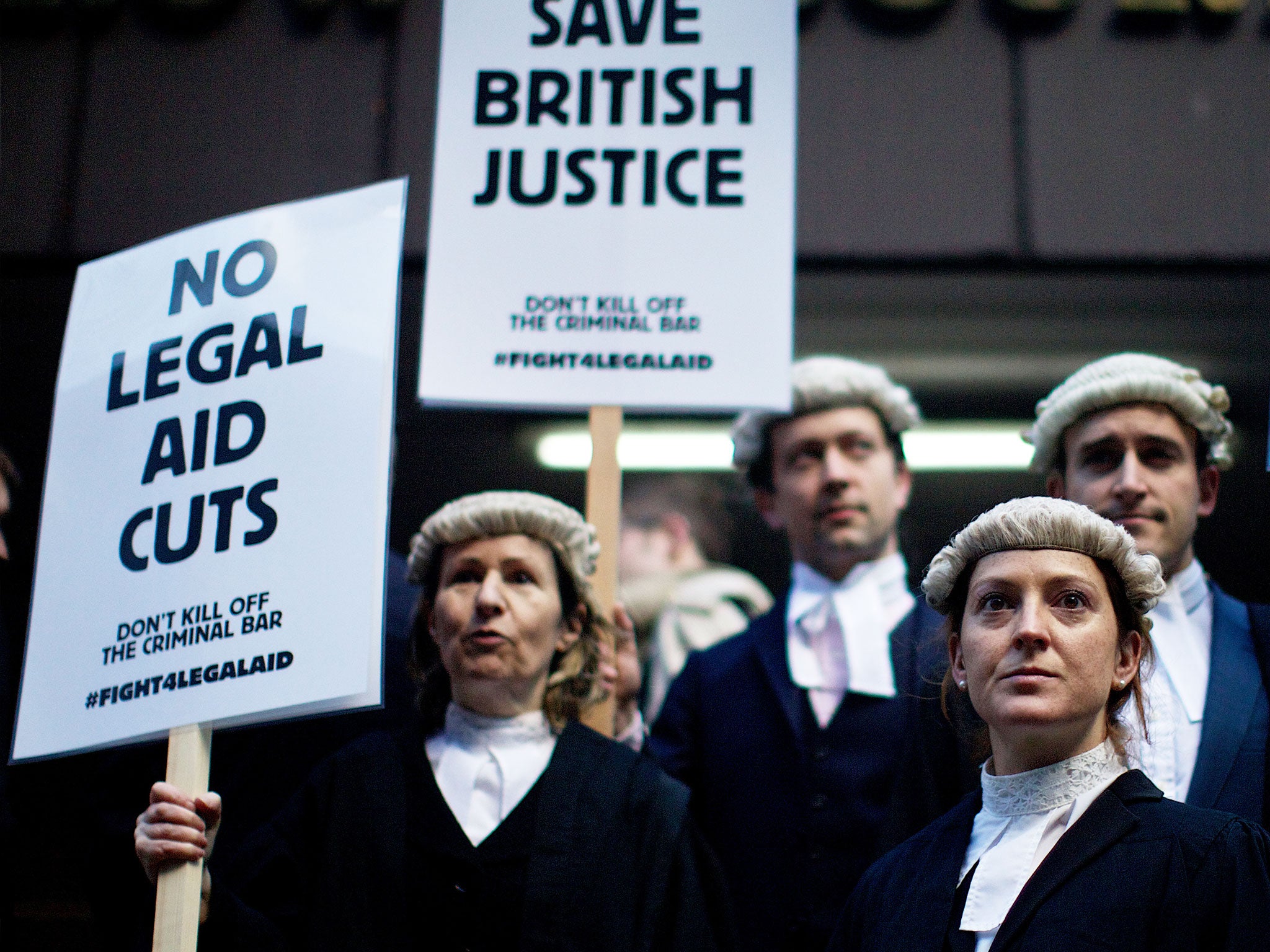The criminal justice system is in tatters – and it will lead to the collapse of the rule of law unless something is done
Cuts to legal aid are pricing the poor out of justice and devastating the criminal defence profession. The crisis must be addressed


Your support helps us to tell the story
From reproductive rights to climate change to Big Tech, The Independent is on the ground when the story is developing. Whether it's investigating the financials of Elon Musk's pro-Trump PAC or producing our latest documentary, 'The A Word', which shines a light on the American women fighting for reproductive rights, we know how important it is to parse out the facts from the messaging.
At such a critical moment in US history, we need reporters on the ground. Your donation allows us to keep sending journalists to speak to both sides of the story.
The Independent is trusted by Americans across the entire political spectrum. And unlike many other quality news outlets, we choose not to lock Americans out of our reporting and analysis with paywalls. We believe quality journalism should be available to everyone, paid for by those who can afford it.
Your support makes all the difference.The criminal justice system can touch any one of us, at any time.
Suddenly – and quite unexpectedly – we could find ourselves as defendant, victim or witness in a criminal proceeding. You might be mugged. You might see your neighbour being assaulted by their partner. You might be the victim of mistaken identity in a scene of public disorder.
So it was a shock to hear the former president of the Supreme Court Lord Neuberger warn just last month of the “imminent breakdown” of the rule of law. The Criminal Bar Association is planning to shut down the courts in response to stagnant fees. In the courts, processes pivotal to safeguarding justice, such as proper disclosure of evidence the police have collected that is favourable to the defence, are failing palpably – and just last week, an expert witness was found to have no expertise at all.
This week, we launch a report showing how almost two decades of underfunding has stripped our criminal justice system to the bare bones, and how things are routinely going wrong at almost every level.
This is a system which is, without exaggeration, on the brink of the collapse. For victims and the accused, a journey through the system is something akin to a nightmare.
One might wonder, how could this happen?
However, when the Ministry of Justice has lost over a quarter of its budget in the past decade, is it really a surprise justice is so severely compromised?
Unsurprisingly, it is those on lower and middle incomes who bear the greater burden. In a recent Populus survey, 60 per cent of respondents said they believed that “people on low incomes are more likely to be convicted of crimes than wealthy people”.
An example of this inequity in action is the overly stringent means test, which leads to many on low incomes accused of a crime having to pay contributions they often can’t afford. The requirement to contribute financially towards the costs of a Crown court case is pushing people well below the minimum income standard, identified by the Joseph Rowntree Foundation as the income needed to reach a socially acceptable standard of living.
The result? Thousands of working people on low incomes, faced with criminal charges, are unable to afford the legal aid contributions. They are denied the right to a fair trial.
Those who land just above the threshold – £22,325, quite a bit below the average UK salary of £29,009 – may be subject to the dreaded “innocence tax”. They will need to pay their own legal fees and, if found not guilty, can recover part of those costs.
However, since a rule change in 2012, those found not guilty can only claim at legal aid rates. In most cases, the legal fees paid will often far exceed the claimable amount – sometimes by four to one. The acquitted person must pay the difference, despite being found not guilty.
The consequences can be earth-shattering. Life savings sacrificed, or significant debt accrued – just to prove your innocence through a fair trial.
Any society that privileges access to justice based on wealth forfeits the claim to be both free and fair – but this is exactly the situation we find ourselves in.
That’s if legal representation can even be found at all.
Poor legal aid rates are devastating the criminal defence profession. Criminal legal aid fees for solicitors have not increased since the 1990s – in fact, they have been cut several times in cash terms. Criminal defence lawyers now routinely earn less than nurses and teachers. Our criminal defence lawyers are overworked, underpaid and subject to a climate of hostility.
This is creating a mass exodus from the profession: there has been a decrease of 30 per cent in the number of firms providing criminal legal aid advice. In some areas, there is a not a single practitioner under the age of 50. There is a risk the defence solicitor will soon be extinct.
If that happens, there will be parts of the country where the poorest and most vulnerable in our society are unable to access legal representation at all.
Justice and the rule of law are supposed to be core British values; since the days of Magna Carta, it has been part of our national identity. Crime will affect nearly everyone at some point in their lives, and so a properly funded justice system is necessary to ensure all our rights are protected. If we fail to act now, it’s a legacy we might as well consign to the history books.
More inaction risks further erosion of faith in the system. It is currently crumbling; a failure to save it could fatally undermine public trust. If we allow it to happen, the consequences could be very bleak indeed.
Christina Blacklaws is the president of the Law Society
Join our commenting forum
Join thought-provoking conversations, follow other Independent readers and see their replies
Comments